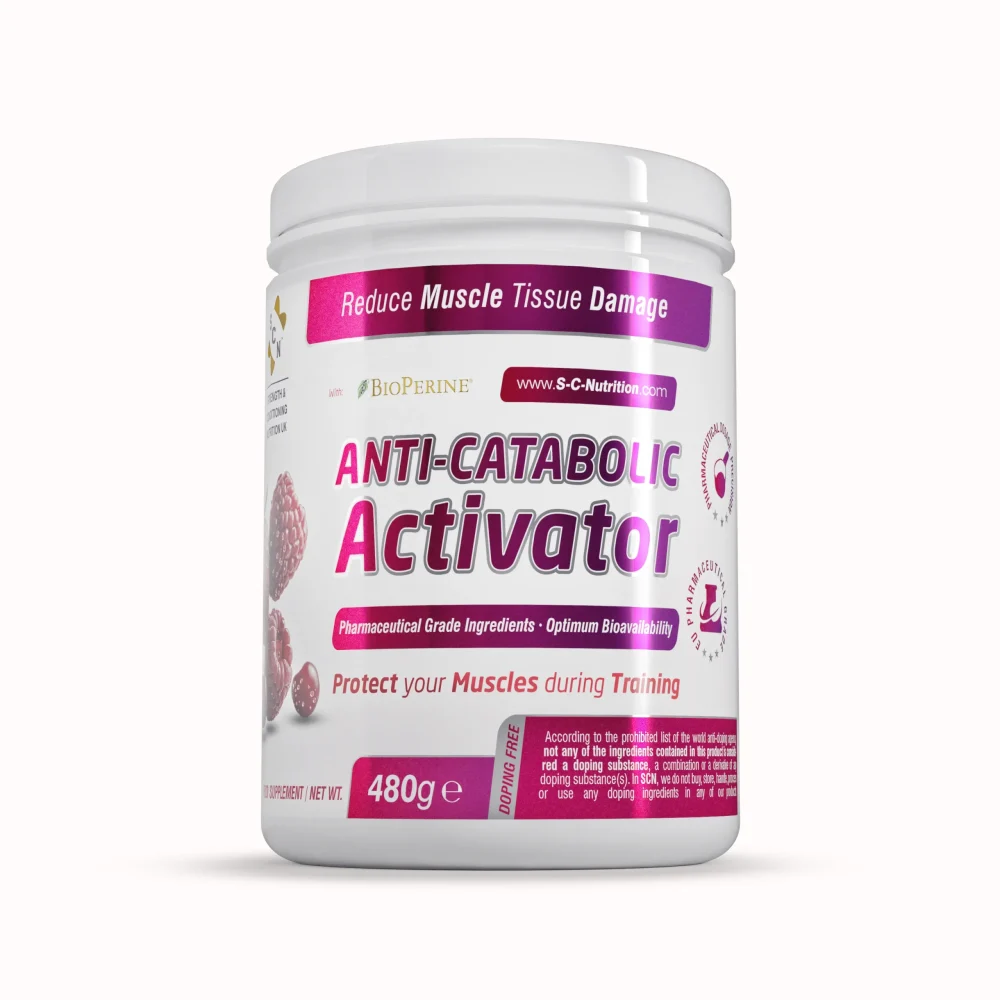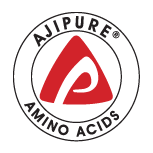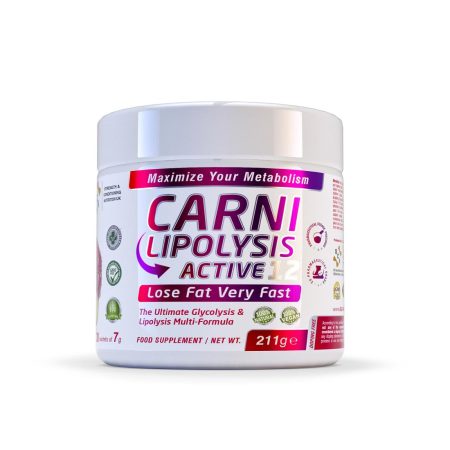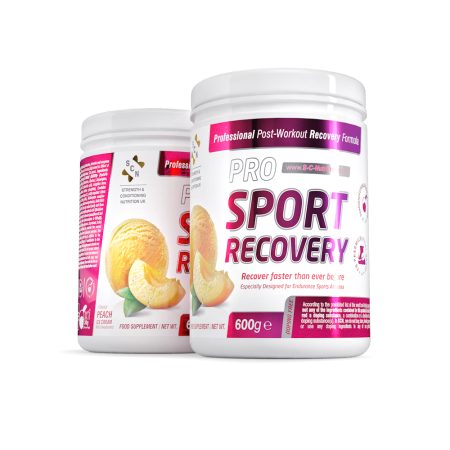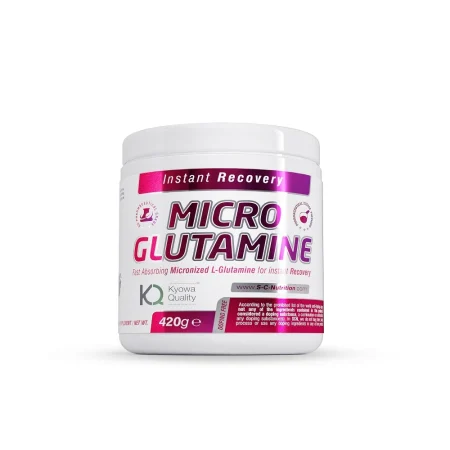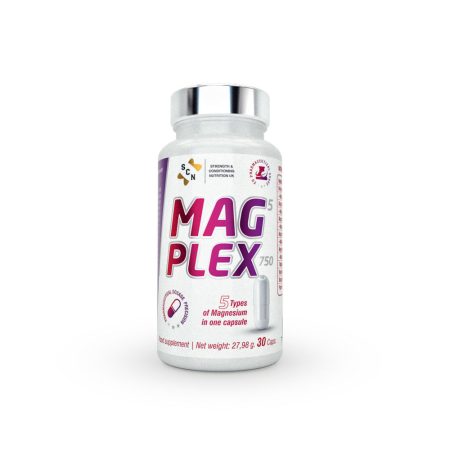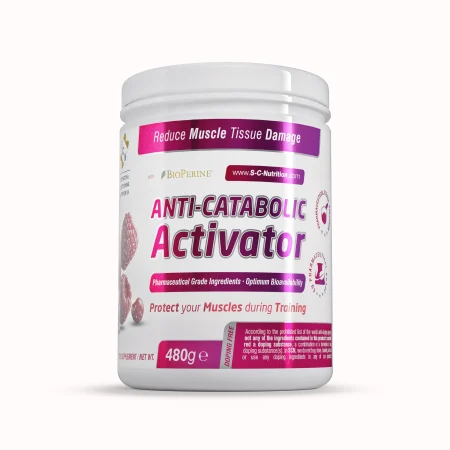Description
Anti-Catabolic Activa.TOR9
Protects your muscles during training
Anti-Catabolics, are ingredients or formulas which reduce the muscle tissue damage during training.
These factors are also able to counterbalance the Hypercatabolism (excessive metabolic breakdown of complex substances (as protein) within the body) which all pro athletes experience during training.
Overtraining in pro athletes is a very often even a daily condition which increases significantly the muscle tissue damage, which most of the times lead to the reduction of the muscle mass, to muscle soreness and to injuries.
As this happens, the recovery products most of the times cannot cover all the damage your muscle tissue has suffered.
Using Anti-catabolic factors before and during training, recovery agents will work better, healing your muscle wounds better and faster.
Anti-Cataboli Activa.TOR9, combines pharmaceutical grade and highly effective anti-catabolic factors, which will help you reduce the muscle tissue damage during your demanding training as a professional athlete.
Anti-Cataboli Activa.TOR9, contains a massive market leading concentration of HMB -Free Acid of 6,4g per dosage and the ashtonishing concentration of the most effective L-Leucine form available, Ajipure® L-Leucine, of 6,4g per dosage.
Real ingredients, the most expensive and effective pharmaceutical grade ingredients as every pro athlete deserves.
Features:
Unique formulation and combination that will cover the need even of the most demanding pro athlete. Feel relaxed, help your muscles to reduce, sleep better, breath better….
| INGREDIENTS | PER DOSAGE |
| HIGHLY BRANCHED POLYMER AMYLOPECTIN | 13700mg |
| HMB (Β-HYDROXY-Β-METHYLBUTYRATE) FREE ACID | 6400mg |
| L-LEUCINA AJIPURE® | 6400mg |
| MAGNESIUM CITRATE | 370mg |
| MAGNESIUM BISGLYCINATE | 370mg |
| MAGMESIUM GLYCEROLPHOSPHATE | 370mg |
| MAGMESIUM GLUCONATE | 350mg |
| PYRIDOXAL 5’ PHOSPHATE (VITAMIN B6) | 17mg |
| BIOPERINE® : BLACK PEPPER EXTRACT, STANDARDIZED TO 95% PIPERINE | 10mg |
AJIPURE® – THE KING OF AMINO ACIDS
We choose Ajipure® from Ajinomoto®, the best and most effective pharmaceutical grade amino acids.
For more than a century, Ajinomoto Co., Inc. has pioneered the development of new and innovative technologies used to manufacture and purify pharmaceutical grade amino acids.
AjiPure® amino acids are fermented using only natural vegetable-based carbohydrates as raw materials.
Ajinomoto Co., Inc. never uses raw materials of animal origin in any production process.
AjiPure® amino acids stem from over 100 years of clinical and scientific research, yielding unsurpassed quality and purity.
Industry leading purification processes allow quicker absorption, faster bio-availability, proven consistency and unrivaled efficacy.
Ajinomoto Co., Inc. is the global leader in production, sales and research of amino acids used for medical, pharmaceutical, nutraceutical, sport, nutrition and health industries.
Ajinomoto Co., Inc., the maker of AjiPure®, is the #1 supplier of pharmaceutical-grade amino acids worldwide. Thanks to the expertise of more than 1,000 scientists and doctors, combined with more than 100 years of experience in amino acid research and development heritage, Ajinomoto Co., is known internationally as a leader in producing life-sustaining and life-enriching amino acids.
i-Leucine = instantized Leucine = Very fast absorption
Leucine is one of the three Branched Chain Amino Acids and sometimes referred to as the ‘main’ amino acid due to the most popular benefit of BCAAs (muscle building) being mostly due to leucine.
Leucine is an activator of the protein known as mTOR, which then induces muscle protein synthesis via S6K; the other two BCAAs may also activate mTOR, but are much weaker than leucine in doing so (and as such, 5g of leucine will be more effective than 5g mixed BCAAs). The leucine metabolite, HMB, is also weaker than leucine at inducing muscle protein synthesis despite being more effective at preserving lean mass from breakdown.
Leucine is a tad different from the other two BCAAs Isoleucine and Valine as leucine seems to have a fair bit of testing on the amino acid in isolation rather than in a BCAA mixture, whereas the other two BCAAs are not as well studied.
The studies assessing leucine mostly look at muscle protein synthesis when additional leucine is added to the diet or to a test meal, and it appears that leucine is able to reliably increase muscle protein synthesis after test meals. Whether this results in more lean mass over a period of time is somewhat less reliable though, and leucine appears to be more effective at promoting gains in muscle in people with lower dietary protein intake and in the elderly (who tend to have impaired muscle protein synthesis in response to the diet).
The interactions of leucine on glucose are not clear. Leucine possesses both blood sugar reducing properties (can release insulin from the pancreas, can directly stimulate glucose uptake into a cell without insulin) but also the opposite (via stimulating S6K, it can inhibit insulin-stimulated glucose uptake). In a cell culture, leucine stimulates glucose uptake for up to 45 minutes and then hinders itself while in living systems acute doses of leucine do not appear to do anything remarkable (some limited evidence that leucine can be rehabilitative in diabetes, but this is preliminary). Isoleucine is a more potent hypoglycemic agent, but to less inhibition of its own actions.
Free Acid HMB = HMB that really works!
HMB (short for β-Hydroxy β-Methylbutyrate) is a metabolite of the amino acid Leucine that, along with KIC (α keto-isocaproate) and isovaleryl-CoA, mediate the effects of leucine. Approximately 5% of dietary leucine is oxidized into HMB, and HMB appears to be the main metabolite of leucine that more effectively prevents the breakdown of muscle protein.
When compared to leucine, HMB appears to be significantly more potent on a gram per gram basis at attenuating the rate of muscle protein breakdown but is less effective than leucine at inducing muscle protein synthesis. Due to this, HMB is marketed as an anti-catabolic agent (purposed to reduce the rate of muscle breakdown) rather than an anabolic agent (purposed to increase muscle mass).
Human trials don’t normally tend to be structured to properly assess the effects of HMB, as most of the studies are a standard diet paired with an exercise regimen investigating the role of HMB in promoting muscle protein synthesis (of which it is similar to leucine in the sense that there are positive results, but quite unreliably so); the limited evidence that assesses HMB during periods of muscle loss are either underpowered or not in athletes.
HMB, currently, appears to be a pretty interesting supplement for the purpose of reducing muscle wasting during periods where muscle atrophy is accelerated (cachexia, AIDS, bedrest) and should theoretically work in athletes on a calorie restricted diet but is not fully established for this role yet (which is a notable issue, since Glutamine has a large dichotomy between clinical and healthy populations).
The Benefits of Magnesium Supplements for Athletes and Exercising
About 25 grams of the magnesium mineral is normally present in the human body. Around 60% of this can be found in the bones while the remainder is within the body’s cellular structure.
It is a necessary mineral as it supports the production of energy as well as the maintenance of healthy cells.
It also enables the body’s muscles to recover quickly from stress and fatigue so that the muscles can contract and relax properly.
The Role of Magnesium in Sports
Magnesium is especially required by athletes as their daily activities involve strength training and muscle development.
They need to have a high endurance to carry out strenuous tasks and being able to recover from such vigorous activities is critical for optimum training and performance.
For this reason, there should always be a sufficient supply of magnesium.
If there is a deficiency in magnesium that cannot be addressed through good nutrition and diet then it may necessary to consider taking magnesium supplements.
The Importance of Magnesium Supplements
As one sweats and urinates often when engaged in a physical activity, the magnesium level inside the body can get depleted.
This can prove to be dangerous, especially for athletes, as it can cause dizziness, high blood pressure and nausea, among others.
Even low level deficiencies are believe to have an impact on performance and ability to recover from heavy training.
Daily recommended dosages may be high for athletes and sports enthusiasts.
Factors that Inhibit Magnesium Absorption
If you want to maximize the efficiency of your magnesium intake, then you should be aware of factors that can reduce its absorption.
Too much protein in the diet is one of the causes of inefficient absorption of this mineral (but also too little protein in the system can have a similar effect).
Alcohol also can interfere with the mechanism by which the body absorbs magnesium so (as is always recommended on health related websites) consider reducing your intake of alcohol if you are concerned about your health and sport performance.
Magnesium Deficiency
When the body’s magnesium level falls beyond the minimum requirement, a person may feel tired and lethargic.
Engaging in strenuous physical activities like sports and exercise can also deplete the body of said mineral as it is excreted in the form of sweat.
Many who are particularly conscious of their nutritional intake look to sports drinks to assist providing their daily requirement of necessary minerals.
But please be aware that only a few sports drinks contain magnesium and always check the label before purchasing if this is important to you.
Benefits of Magnesium Supplements for Sporting Performance
It is only natural for a person to sweat a lot when engaged in sports and other similar activities.
However, one needs to maintain the proper levels of magnesium in the system in order to carry out this active lifestyle without posing any risks to one’s health.
In addition, there is some research evidence that indicates that taking magnesium may improve performance, particularly for those who are competing in endurance type events.
Aside from eating food sources that are rich in magnesium, sports-minded people can also take in dietary supplements to ensure adequate supply.
Adding magnesium supplements to your everyday nutritional program will ensure that your body is supplied with sufficient to perform vigorous activities.
The mineral is also needed by the body to recuperate from fatigue and exhaustion properly, so that muscle cramps and other similar problems can be avoided.
Magnesium citrate
Citrate might sound familiar too—consider it an erudite way of saying that it’s derived from citric acid (in this case, magnesium salt is obtained from the citrus acid). With excellent bioavailability—that is, the efficacy with which a substance is absorbed and used by the body—it’s no wonder magnesium citrate one of the most highly recommended magnesium supplements by health professionals.
Often used to naturally support digestion—specifically, to alleviate constipation and acid indigestion—it’s also, bonus points, easy on the wallet. However, it may lead to dehydration (and the imbalance of minerals that arrives with this), in that it pulls water into the intestines.
Magnesium glycinate
Feeling stressed? This may be the form for you. While magnesium in its many different forms has been shown to naturally support muscle relaxation, magnesium bisglycinate might just take the cake (to note: the amino acid bisglycine is known for the calming impact it can have on the mind and body).
Additionally, it has optimum bioavailability and, unlike some of its kin, isn’t known for its laxative properties.
Magnesium Gluconate
Corrects Deficiency
Low dietary intake may not be the only cause of magnesium deficiency; health conditions can necessitate supplements. Magnesium gluconate can restore magnesium when drugs such as diuretics, antibiotics and medications for cancer treatment may impair absorption of nutrients. Crohn’s disease, gluten sensitivity and intestinal surgery may cause reduced absorption of nutrients and loss of magnesium through diarrhea. Alcoholics commonly suffer from low blood levels of magnesium and magnesium gluconate can restore the levels to normal. Ability to absorb magnesium decreases with age and seniors are more likely to take drugs that interact with magnesium. Magnesium supplements may help with these imbalances.
Antacid and Laxative
As a supplement, magnesium gluconate has the best bio-availability of all magnesium supplements. Used as an antacid, it reacts with stomach acid to increases gastric pH for relief of indigestion and heartburn. Magnesium gluconate may be used as an electrolyte replacement and laxative. In large doses, magnesium gluconate taken as an antacid or laxative can lead to elevated levels of magnesium. Mobey’s Medical Dictionary gives a high-alert drug warning for pregnant women taking magnesium gluconate. The supplement can create an osmosis effect by drawing water into intestines and causing distension and diarrhea.
Cardiovascular Benefits
Supplements of magnesium gluconate may help regulate normal blood pressure, preventing hypertension and cardiovascular disorders. The “American Journal of Clinical Nutrition” reported the results of The Honolulu Heart Study stating magnesium had a strong association with blood pressure, although it was difficult to separate the exact effects from other variables.
Magnesium Glycerophosphate
Magnesium doesn’t naturally exist by itself. Rather, it is attached to some type of organic or inorganic acid.
Minerals attached to acids are called mineral salts.
All forms of magnesium used in dietary supplements provide one or more magnesium salts.
In the case of magnesium glycerophosphate, magnesium is attached to glycerol and phosphoric acid (i.e. phosphate).
Once the glycerophosphate is cleaved off of the magnesium in the body, not only is the magnesium available for use, but so is the phosphate and the glycerol.
Phosphate is the most abundant element in the human body, and phosphate, glycerol and magnesium can be used to help generate ATP.
In fact, one molecule of glycerophosphate can be used to produce 19 molecules of ATP after passing through the Krebs cycle.
Magnesium Glycerophosphate and Cardiovascular Health
Premature ventricular contractions (PVCs) are extra heartbeats that begin in one of a heart’s two lower pumping chambers (ventricles). These extra beats disrupt regular heart rhythm, sometimes causing feelings of fluttering or skipped heartbeat in your chest. Magnesium glycerophosphate is associated with a decrease in PVCs.
Magnesium Glycerophosphate and Muscular Relaxation
Approximately 27% of magnesium in the body is found in muscles, which makes sense considering that—while calcium is needed for muscle contraction—magnesium is needed for muscle relaxation.
Yet despite this physiological role, analyses of clinical research suggest that magnesium supplementation has not decreased the frequency or intensity of skeletal muscle cramps compared to placebo.
However, magnesium glycerophosphate effect on spasticity (a condition in which certain muscles are continuously contracted, causing stiffness or tightness of the muscles) is positive.
The spasticity is assessed by the mean of the modified Ashworth scale and the range of motion for hip flexion and abduction, knee flexion and ankle dorsiflexion. The spasticity is efficiently reduced for the movement of the hips and the knees.
Pyridoxal 5′ Phosphate:
Vitamin B6 and Its Role in Athletic Performance
Research has uncovered many important discoveries in regard to athletes, nutrition and vitamins in the past decade alone.
While athletes typify a certain fitness ideal, many of them straddle a fine line between being in great shape, poor eating habits and being vitamin deficient.
This is particularly true in regard to the “B vitamins.”
In a summary article appearing in Science Daily (December 27, 2006)[i],[ii] based on research by the University of Oregon and entitled: “Poor Athletic Performance Linked To Vitamin Deficiency,” the authors found:
“Active individuals lacking in B-vitamins — including college athletes and other elite competitors — may perform worse during high-intensity exercise and have a decreased ability to repair and build muscle than counterparts with nutrient-rich diets, a new study concludes.”
The University of Oregon Study again confirmed research[iii] conducted in 1991 by van der Beek that found:
“Vitamin deficiencies can certainly impair exercise performance. A daily intake of less than one-third of the RDA for several of the B vitamins (B1, B2 and B6) and vitamin C, even when other vitamins are supplemented in the diet, may lead to a significant decrease in VO2max and the anaerobic threshold in less than four weeks.”
Vitamin B6 Function: The Winning Attitude
As athletes burn greater amounts of calories, hydrate to a greater degree and subsequently sweat and urinate fluids, water soluble vitamins such as vitamin B6 leave the body.
Of the B vitamins, unlike B12 or B1, (Pyridoxine) vitamin B6 function’s are not as widely known and yet vitamin B6 supplementation may play a particularly significant role in athletic performance and even the “performance mentality” of athletes. Although most references to vitamin B6 function tell us that in normal diets B6 deficiencies are rare, in athletes where diets are limited and large amounts of calories are burned, deficiencies in the amount and functions of vitamin B6 may be present and thus require a vitamin B6 supplement.
For example, the National Institutes of Health Guidelines (reviewed September 15, 2011), point to Vitamin B6 supplement deficiencies as leading to: “…anemia, itchy rashes…depression, confusion, and a weak immune system.”
As quoted in Everyday Health, an online publication, Nutritionist Dee Sandquist, MS, RD, CD, a spokesperson for the American Dietetic Association states that the function of vitamin B6: “Is important for cardiovascular, digestive, immune, muscular, and nervous system function. The B6 vitamin is needed for proper brain development and function and to make the hormones serotonin and norepinephrine, which affect mood…”
Numerous articles have been written about depression in athletes. In a 2013 study reported in the prestigious Clinical Journal of Sport Medicine[iv] entitled: “The prevalence of failure-based depression among elite athletes,” swimmers (not hockey or football players) were tested for depression. The study concluded:
“The findings suggest that the prevalence of depression among elite athletes is higher than what has been previously reported in the literature. Being ranked among the very elite athletes is related to an increase in susceptibility to depression, particularly in relation to a failed performance.”
While it would be irresponsible in this post to claim that depression among elite athletes may be due to not meeting the RDA of vitamin B6, there is no harm in vitamin B6 supplements in athletic diets – at any level of performance with a B 6 supplement to help athletes maintain a positive mental outlook.
An article in The Daily Beast (February 3, 2014) entitled: “Are Female Long-Distance Runners More Prone To Suicidal Depression?” the article states many facts that may contribute to depressed athletes and that, “Stories of eating disorders abound.”
The point here is that athletes (even middle of the pack athletes like us) get depressed. Despite stories about “runner’s high,” poor diets and a lack of B vitamins may be a contributing factor. There are many things athletes at any level of competition can do to feel better about themselves and their performance. Vitamin B 6 supplement may prove of benefit especially when nutrition is poor and endurance is pushed.
[i] Oregon State University. “Poor Athletic Performance Linked To Vitamin Deficiency.” Science Daily. Science Daily, 27 December 2006. (also please see reference below)
[ii] Wolfe, K., B-vitamins and exercise: does exercise alter requirements? 2006, Int J Sport Nutr Exerc Metab.Oct;16(5):453-84.
[iii] van der Beek E. Vitamin supplementation and physical exercise performance. Journal of Sport Sciences. 1991;92:77–79.
[iv] Hammond, T. Clin J Sport Med. 2013 Jul;23(4):273-7
BIOPERINE®:
Makes all other ingredient work better!! This what “natural bioavailability enhancer” means.
WHAT IS IT AND WHY IS IT IN SPORTS NUTRITION PRODUCTS?
Bioperine is a plant extract derived from two types of pepper plants, namely, long pepper (Piper longum) and black pepper (Piper negrum). The natural chemical compound is a patented product made from the standardized piperine extract from the above mentioned pepper species. BioPerine® from Sabinsa (East Windsor, NJ) is a patented standardized extract from black pepper, containing not less than 95 percent piperine.
Pharmacological studies have shown that piperine reduces inflammation and pain, possesses anticonvulsant and antiulcer activity, protects the liver, has deleterious and antioxidant activity. Results from previous studies demonstrated that piperine showed anxiolytic and antidepressant like activity. Piperine also inhibited monoamine oxidase (MAO) activity, and increased the levels of noradrenaline and serotonin in some regions of the mouse brain.
All of these characteristics make it perfect for the dieting male or female, but more importantly, it is a clinically proven bio availability enhancer for nutrients. It shows increased blood supply to the GI tract, increased emulsifying content of the gut and increased active nutrient transport.
According to the Merck Manuals, bioavailability is the extent and rate within which an active drug enters systemic circulation after passing through the first-pass metabolism sites, namely, the intestinal wall and liver. Bioperine has been shown to boost the bioavailability of nutrients, namely beta-carotene, vitamin B, B6, vitamin C, selenium, and co-enzyme Q10, and other ingredients found in various supplements — including male enhancement supplements.
According to research conducted by the manufacturer, bioperine substantially increases the absorption of selenium (30%), beta carotene (60%), vitamin B6 (140-250%) as well as coenzyme Q10. So if your fat burner does not contain bioperine, it should as its clinically been found to enhance the active transport of nutrients and based on a study, it enhances the effect of caffeine.
Product Details: 480g | Scoop 50ml (32g) | 15 training days supply | Sweet Red Fruits Flavour
- For short training sessions (up to 120′): Consume 30-40 minutes before training.
- For long endurance training sessions (over 120′): Start consuming the mix 30 minutes before training until the middle of the training.
Active Ingredients: Highly Branched Polymer Amylopectin (source of sulfur dioxide and sulfates), L-Leucine Ajipure®, HMB (β-Hydroxy-β-methylbutyrate) Free Acid, MagPlex4 (magnesium bisglycinate 28%, magnesium glycerolphosphate 28%, magnesium citrate 28%, magnesium gluconate 16%), Pyridoxal 5’ Phosphate (vitamin B6), Bioperine® : Black pepper extract, standardized to 95% piperine.
Flavouring & other Ingredients: Maltodextrin, Flavour powder, Silicone Dioxide, Sucralose, Citric Acid, beetroot powder (colour)
Note: Supplements with high concentration in active ingredients and no preservatives, may turn from powder form to solid form. This is a natural effect of ingredients which are extra sensitive in humidity. Try to consume the product 20-30 days after opening. Keep in a dry and cool place always with the lid well closed. Do not use wet hands or tools to take the scoop from inside the tube.

*This website is for your education and general health information only. The ideas, opinions and suggestions contained on this website are not to be used as a substitute for medical advice, diagnosis or treatment from your doctor for any health condition or problem. Users of this website should not rely on information provided on this website for their own health problems. Any questions regarding your own health should be addressed to your own physician. Please do not start or stop any medications without consulting with your doctor. We neither encourage you to do so, nor can we be held responsible for the fall out of failing to seek the counsel of a medical health practitioner.

